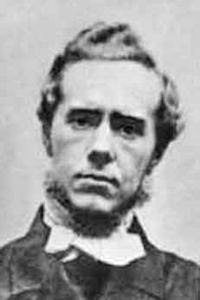James Hudson Taylor
| James Hudson Taylor | |
|---|---|

Missionary to China
|
|
| Born |
22 May 1832 Barnsley, Yorkshire, England |
| Died | 3 June 1905 (aged 73) Changsha, Hunan, Qing China |
| Education | Royal College of Surgeons |
| Title | MRCS FRGS |
| Spouse(s) |
Maria Jane Taylor (née Dyer); Jennie Taylor (née Faulding) |
| Parent(s) | James Taylor Amelia Hudson |
James Hudson Taylor (Chinese: 戴德生; 21 May 1832 – 3 June 1905) was a British Protestant Christian missionary to China and founder of the China Inland Mission (CIM, now OMF International). Taylor spent 51 years in China. The society that he began was responsible for bringing over 800 missionaries to the country who began 125 schools and directly resulted in 18,000 Christian conversions, as well as the establishment of more than 300 stations of work with more than 500 local helpers in all eighteen provinces.
Taylor was known for his sensitivity to Chinese culture and zeal for evangelism. He adopted wearing native Chinese clothing even though this was rare among missionaries of that time. Under his leadership, the CIM was singularly non-denominational in practice and accepted members from all Protestant groups, including individuals from the working class, and single women as well as multinational recruits. Primarily because of the CIM's campaign against the Opium trade, Taylor has been referred to as one of the most significant Europeans to visit China in the 19th Century. Historian Ruth Tucker summarises the theme of his life:
No other missionary in the nineteen centuries since the Apostle Paul has had a wider vision and has carried out a more systematised plan of evangelising a broad geographical area than Hudson Taylor.
Taylor was able to preach in several varieties of Chinese, including Mandarin, Chaozhou, and the Wu dialects of Shanghai and Ningbo. The last of these he knew well enough to help prepare a colloquial edition of the New Testament written in it.
Taylor was born on 21 May 1832 the son of a chemist (pharmacist) and Methodist lay preacher James Taylor and his wife, Amelia (Hudson), but as a young man he ran away from the Christian beliefs of his parents. At seventeen, after reading an evangelistic tract pamphlet entitled "Poor Richard", he professed faith in Christ, and in December 1849, he committed himself to going to China as a missionary. At this time he came into contact with Edward Cronin of Kensington—one of the members of the first missionary party of the Plymouth Brethren to Baghdad. It is believed that Taylor learned his faith mission principles from his contact with the Brethren. Taylor was able to borrow a copy of China: Its State and Prospects by Walter Henry Medhurst, which he quickly read. About this time, he began studying the languages of Mandarin, Greek, Hebrew, and Latin.
...
Wikipedia
